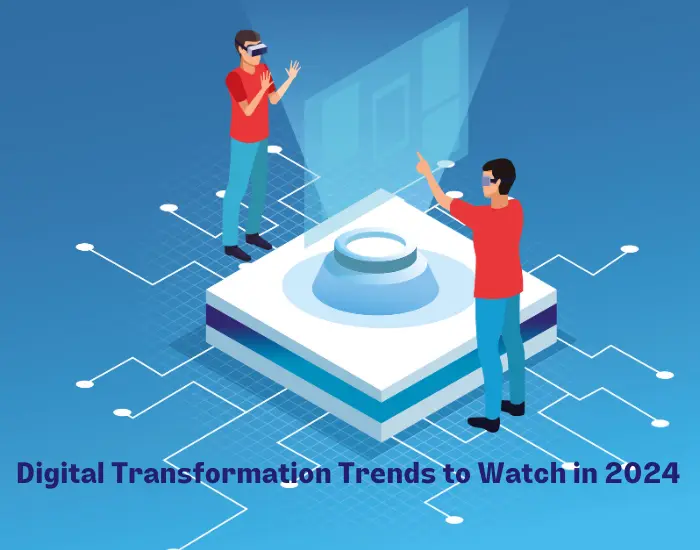Introduction
The digital era is relentless. When you think you’ve got a handle on the latest tech, the landscape shifts, demanding businesses to adapt or risk falling behind. This constant evolution is where digital transformation comes in – the ongoing process of integrating technology into all aspects of your organization to improve efficiency, agility, and customer experience.
As we hurtle towards 2024, let’s explore the key trends that will shape digital transformation journeys.
AI & ML: From Buzzword to Business Essentials
Artificial intelligence (AI) and machine learning (ML) are no longer confined to science fiction movies. These powerful technologies are rapidly becoming embedded into everyday business operations. In 2024, we will see a significant rise in their practical applications:
- Automated Workflows: Repetitive tasks like data entry, customer service inquiries, and report generation will be increasingly handled by AI-powered tools, freeing up human employees for more strategic work.
- Data-Driven Decisions: ML algorithms will analyze vast amounts of data to identify patterns, predict trends, and generate actionable insights. Optimizing marketing campaigns, streamlining supply chains, or personalizing product recommendations – all powered by AI.
- Enhanced Customer Interaction: Chatbots powered by natural language processing (NLP) will become even more complex, offering personalized support, and addressing customer queries efficiently.

Hyper-Automation: The Machines Are Here!
Hyper-automation isn’t about robots taking over the world (at least, not yet). It’s about intelligently combining various automation tools – like robotic process automation (RPA), intelligent document processing (IDP), and AI – to create a seamless, automated workflow. This can revolutionize how businesses operate:
- Streamlines Processes: Hyper-automation can eliminate manual tasks across departments, from finance and HR to sales and marketing. This not only reduces errors but also frees up employees to focus on higher-value activities.
- Improved Efficiency: By automating repetitive tasks, businesses can significantly increase efficiency and achieve more with less. Imagine processing invoices in seconds or scheduling meetings effortlessly.
- Cost Savings: Automating manual processes can lead to substantial cost reductions, freeing up resources for further innovation and growth.

Democratizing Technology with No-Code/Low-Code Solutions
In the past, building custom applications required a team of skilled programmers. Thankfully, no-code/low-code platforms are changing the game. These user-friendly tools allow even non-technical staff to build apps and automate workflow using drag-and-drop interfaces and pre-built templates.
The benefits for businesses are numerous:
- Empowered Employees: With no-code/low-code tools, citizen developers within departments can create solutions to their specific needs without relying on IT teams.
- Faster Development: Building applications with pre-built components significantly reduces development time compared to traditional coding. This allows businesses to adapt quickly to changing market demands.
- Reduced Costs: No-code/low-code platforms eliminate the need for extensive coding resources, leading to significant cost savings on development projects.

Cloud Computing: The New Normal
Cloud computing has become the foundation of modern digital transformation strategies in 2024, its dominance will continue:
- Scalability on Demand: Businesses can easily scale their cloud resources up or down to meet fluctuating needs. This allows for rapid growth without significant upfront investment in infrastructure.
- Enhanced Collaboration: Cloud-based solutions enable seamless collaboration between teams regardless of location. This is especially crucial in today’s hybrid work environments.
- Focus on Innovation: By offloading IT infrastructure management to cloud providers, businesses can free up internal resources to focus on core competencies and innovation.
However, the future of cloud lies in the multi-cloud and hybrid approach. Businesses will likely leverage different cloud providers and on-premise infrastructure to optimize resource allocation and cost management.

Personalization: The Customer is King (and Queen, and Everyone Else)
In today’s competitive landscape, generic customer experiences simply don’t cut it. Successful businesses will prioritize personalization in 2024:
- Customer Data Platforms (CDPs): These platforms will be crucial for collecting, unifying, and analyzing customer data from various sources. This allows businesses to create a 360-degree view of their customers and tailor experiences accordingly.
- Hyper-Personalized Interactions: Imagine marketing campaigns that speak directly to a customer’s needs, product recommendations based on past purchases, or chatbots that address specific concerns. This level of personalization will be key to building customer loyalty and driving sales.
- The Power of AI: AI can analyze customer behavior patterns and predict preferences. This information can be used to personalize product recommendations, tailor content marketing strategies, and deliver exceptional customer service experiences.

Sustainability: A Digital Transformation Imperative
Environmental responsibility is no longer a fringe concern; it’s a core business value. Digital transformation plays a vital role in achieving sustainability goals:
- Data-Driven Sustainability: Businesses will leverage big data analytics to identify areas for improvement in their operations. This could involve optimizing energy consumption, reducing waste, or streamlining logistics for a lower carbon footprint.
- Eco-Friendly Technologies: Cloud computing, with its inherent efficiency, can contribute to reduced energy usage. Additionally, businesses will explore technologies like AI to optimize resource utilization and minimize environmental impact.

Metaverse: A New Frontier for Customer Engagement
The metaverse, a virtual world where users can interact through avatars, is still evolving. However, it holds immense potential for digital transformation:
- Immersive Customer Experiences: Imagine test-driving a car virtually, attending a product launch event in the metaverse, or trying on new clothes in a digital showroom. These immersive experiences can revolutionize customer engagement and brand loyalty.
- New Revenue Streams: Businesses can explore opportunities for creating and selling virtual products or experiences within the metaverse. This opens doors to entirely new revenue streams and business models.
- Evolving Marketing Strategies: Businesses will need to adapt their marketing strategies to reach customers within the metaverse. This could include creating virtual storefronts, sponsoring metaverse events, or developing engaging games and experiences.

Agility is the New Advantage: Embracing Change
The digital landscape is constantly changing, and businesses need to be agile to keep pace. In 2024, agility will be a key differentiator:
- Flexible Work Models: The hybrid work model, with a blend of remote and in-office work, is here to stay. Businesses will need to embrace flexible work arrangements to attract and retain top talent.
- DevOps Practices: DevOps, which emphasizes collaboration between development and operations, will be critical for faster software delivery and innovation.
- Breaking Down Silos: Hierarchical structure can hinder agility. Businesses will need to break down departmental silos and encourage a culture of collaboration to adapt quickly to changing market demands.

Securing the Digital Frontier: A Constant Vigilance
As businesses become increasingly reliant on technology, cybersecurity threats will continue to pose a significant risk. In 2024, cybersecurity will remain a top priority:
- Robust Security Measures: Businesses will need to invest in comprehensive security solutions, including firewalls, intrusion detection systems, and data encryption.
- Empowering Employees: Employees are often the first line of defense against cybersecurity. Regular security awareness training will be crucial to ensure everyone plays a role in protecting sensitive data.
- Staying Ahead of Threats: The cybersecurity landscape is constantly evolving. Businesses need to stay updated on the latest threats and adopt a proactive approach to security.

Conclusion
These are just a few important digital transformation trends that will redefine businesses in 2024 and beyond. By staying aware of these trends and integrating trends that align with your unique objectives, you can ensure that your organization continues to thrive in this dynamic digital age. At Alt Digital Technologies, we understand that digital transformation is not a one-off event, but a continuous journey of constant enhancement and adaptation.
We invite you to embrace this change and harness the power of technology with us. Together, we can elevate your business to new heights. Don’t just adapt to the digital age, excel in it with Alt Digital Technologies.
Ready to transform your business? Contact us today and let’s embark on this digital journey together. Your success is our mission. Let’s make it happen!



